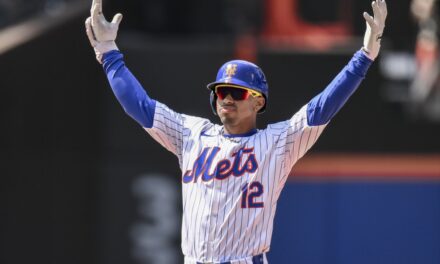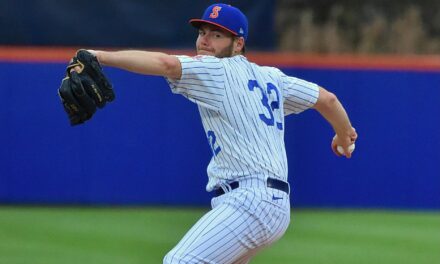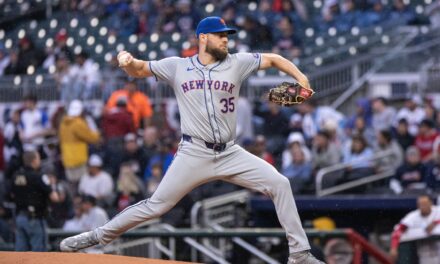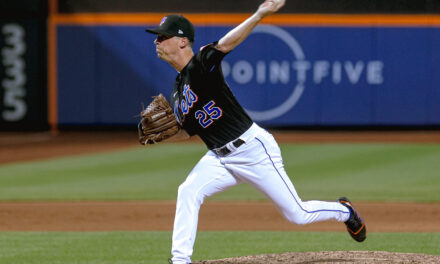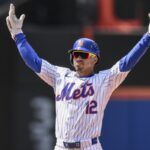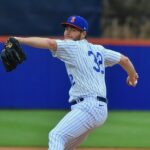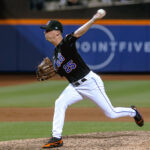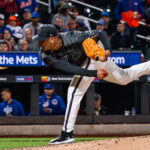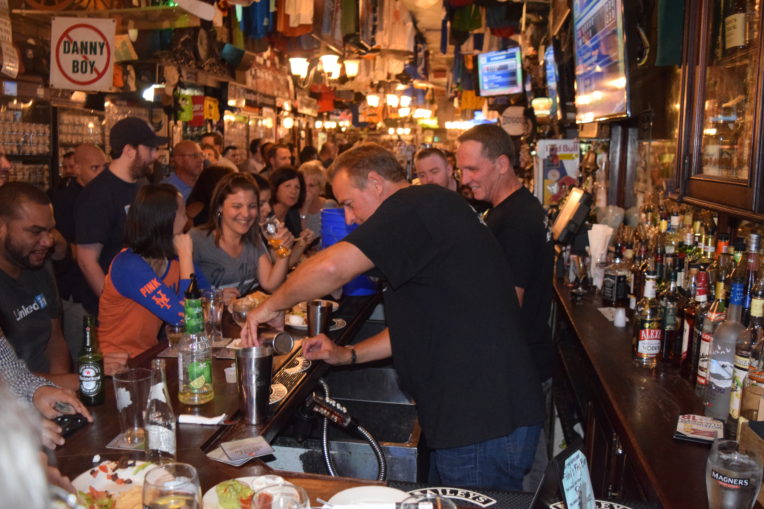
Photo by Sean Conklin
Standing in Foley’s NY Pub and Restaurant last Friday night, the premier baseball establishment in Manhattan featuring a museum-worthy collection of memorabilia and collectibles, I was near the back of the West 33rd Street bar. I was waiting my turn as a member of the media to get the chance to speak with two former starting pitchers who combined to win 356 games, appear in seven All-Star Games, and win seven World Series between them.
Approaching with my notebook scribbled with questions in one hand, and my Sony tape recorder in the other, I encountered two affable and extremely humble individuals waiting, who had just given two hours of their time to help raise money for a friend of the bar’s who was diagnosed with the devastating disease, amyotrophic lateral sclerosis (ALS).
As I extended my hand out to greet them both, my personal memories from my fandom started to flood back as I was now standing in front of Al Leiter and David Cone.
Leiter, 51, and Cone, 54, spent seven years with the Mets, both bestowing fans with many individual moments, including Cone’s Game Six performance in the 1988 NLCS and striking out 19 Phillies on the last game of the 1991 season.
For Leiter, memories flood of the one-game playoff in Cincinnati in 1999, tossing a complete-game shutout to advance the Mets to the postseason for the first time since 1988. Or tossing 15.2 innings (most from either team) in the 2000 Subway World Series, posting a 2.87 ERA with 16 strikeouts.
The two share much in common; both playing for the two New York franchises, in the top-ten in Mets’ career wins and innings pitched, and are current broadcasters. They also share an extreme appreciation from the New York fans, who cherish the pair of one-time aces and are revered by both fan bases.
I had the privilege of speaking with Cone and Leiter for a few minutes after the event at Foley’s last week, where we discussed their respective trades to the Mets, their tenure with the team, and some of their lasting memories.
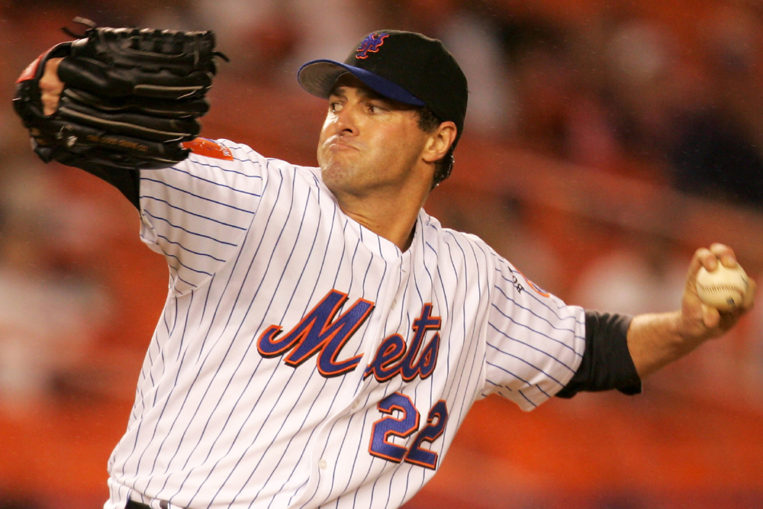
MMO: Growing up as a Mets fan in New Jersey, what were your initial reactions when you were traded from the Florida Marlins to the Mets in 1998?
Al: It was truly a dream come true. The time in which in my career I was traded, I had established myself and had been in the big leagues for several years. I was ready for it, to be a Met, to wear the Mets colors and play home games at Shea Stadium.
Truly, honestly, you know we hear this stuff from other players and people, but I was honestly living out a dream by playing for the Mets.
MMO: What are your memories from the one-game playoff in ’99 against the Reds? Where does that game rank all-time for you in your career?
Al: Because it wasn’t the Word Series, the Game 7 World Series with the Marlins against the Indians I would have to put higher, a couple moments in the ’93 World Series with the Blue Jays, and then there’s the ’99 game.
What was unique about it was after we beat the Pirates, we had dinner at the Diamond Club at Shea Stadium wondering whether we would fly to Arizona and have Game One against Arizona, or fly to Cincinnati and have to play the play-in. We were waiting for Cincinnati to finish their game against Milwaukee, and if they won we had to play them.
ESPN, 163rd game, crazy crowd, Riverfront, Big Red Machine, you know, what I remember back with Pete Rose, Tony Perez, [Dave] Concepcion, and Johnny Bench. It was one of those [games] where I had it.
Edgardo hits a home run. Rickey hits a home run, I get a nice little lead. Totally frozen moment in time.
MMO: Your Mets’ teams had some interesting characters: Ventura, Valentine, Turk, Rickey, Piazza, etc. How close-knit were you guys during your tenure?
Al: Great group of guys. Johnny Franco was absolutely the leader. He didn’t just have the ‘C’ on his uniform, he was the uniter. We would fly into a respective city, and if it was early he’d get on the PA on the airplane and say, hey, we’re all having dinner at Morton’s or Gibson’s or whatever. Whatever the place was, everyone would show up. There were no barriers; there weren’t barriers with whether you spoke English or not. Latin, black, white, it didn’t matter, Johnny Franco was our uniter.
As a result of that, I think many of the sabermetricians don’t understand team chemistry because it’s hard to quantify. But if you and all of these people in this room truly like each other, we cheer differently, we root for you differently, we care about you differently. I really believe that factors three, four five, six wins. I don’t know what it is.
So to answer it, we really had a great group. We did. Guys were friends, we hung out. We go for a beer, you go for dinner, you stay out late and talk about the game.
MMO: Looking back at your seven seasons in Flushing, are there memories or moments that stand out most for you?
Al: Oh my God, as you ask these questions for me from the day I took my promo photos at Shea Stadium in front of the dugout until they didn’t sign me back in ’05, all of it. Honestly, I was living the dream. It sounds, yeah right you’re full of shit, but no. I was living the dream.
I drove over the Triborough Bridge, I lived on the Upper East Side [and] I wanted to stay in Manhattan. Pull into Shea Stadium, saw the same security guards, park in the player’s lot, and walk down into the clubhouse. Every aspect of it was awesome and I cherished it.
I had two shoulder surgeries when I was a young kid, twenty-three years old and twenty-five after I got traded from the Yankees to the Blue Jays. So when I finally got healthy, which was 28 until I was 40, everything was gravy.
MMO: A pitch you’ll always be always remembered for was your cutter. Is it true that either Ron Guidry or Dave Righetti taught you that pitch when you were with the Yankees in the minors?
Al: Ron Guidry via through Dave Righetti. So it was a slider and I threw it really hard. It was like a fastball that had crazy movement. And then the harder I threw it I was like, well f***, it’s a cutter.
MMO: Did you have players coming up to you and asking how to throw it?
Al: Yeah totally, totally. Even until this day, I do stuff at MLB Network, and I go around to teams and there’s always a guy that’ll say, “Hey, Mr. Leiter.” I sound like an old geezer! [Laughs.] But they’ll ask me how to throw it.
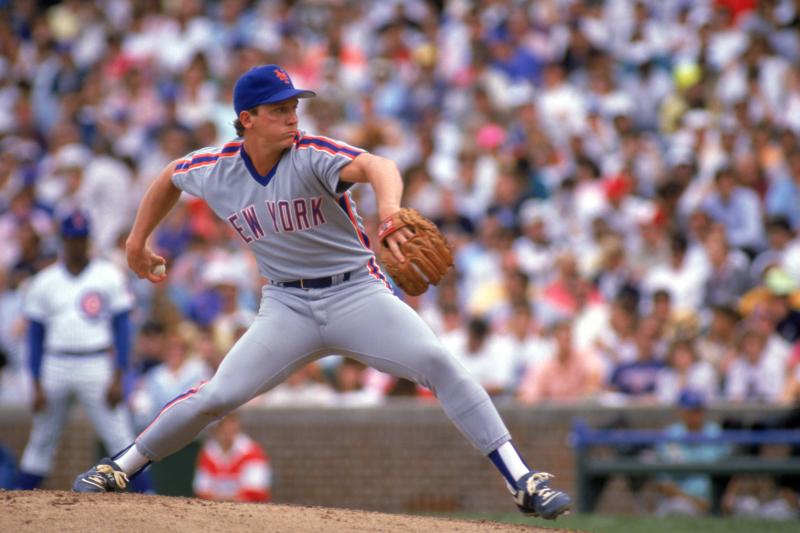
MMO: You were a Kansas City native and were drafted by your hometown Royals in 1981. When you were traded to the Mets in March 1987 to the Mets, what were your thoughts coming to New York?
David: Oh, I was intimidated as hell! I was coming to the ’86 Mets, a legendary team. I didn’t know how I’d fit in, I didn’t say boo for two weeks. In spring training, when I came over, I didn’t even want to talk because I was so intimidated by everybody.
MMO: You had one of your most dominant seasons of your career in 1988 (20-3, 2.22 ERA, 145 ERA+). What do you remember most from that season?
David: I remember a team that should’ve done more. I believe that the ’88 team was better than the ’86 team talent-wise. But the proof is in the pudding. The ’86 team won so there was a grit there in the ’86 team that the ’88 team didn’t have. Kevin McReynolds in left field and Strawberry in right field, two MVP candidates. The ’88 team was great but it underachieved.
MMO: You’ve had a ton of impressive individual accomplishments in your career. Any that stand out during your Mets tenure?
David: Oh God, so many times. There are a lot of individual performances but I remember more the fans at Shea Stadium, the old Shea. That’s back when the Mets owned New York City. We used to play exhibition games at Yankee Stadium back then, and it was dead. Yankee Stadium was dead. Shea Stadium was alive, it was the ticket to have and I’ll never forget that.
I’ll never forget people asking me for tickets to Mets games as a player through the late ‘80s and early ‘90s. It was the place to be. Shea Stadium was the place to be.
MMO: Throughout your career, you were known as a guy that was available to the media, even after bad losses. How important was that player/media relationship for you? And is it true that you wanted to be a sportswriter had baseball not worked out for you?
David: I did, I did. I was enrolled to go to the University of Missouri Journalism School, one of the best journalism schools in the country. I ended up signing a professional contract to play baseball, but that was my plan. I never thought I was good enough to be a player. So I thought this is what I want to do with my life, what you’re doing with your life.
It’s a simple formula to me and I don’t get it, I just don’t get it. It’s a simple formula: be available, be honest, and don’t take yourself too seriously. It’s so simple to me and I don’t get how modern players struggle with the media. They build you up to break you down, you have to understand that. You have to be available, honest, and don’t take yourself too seriously. If you do that, you get the benefit of the doubt in the long run. That would be the only advice I would give to any player today.
MMO: July 18, 1999, your perfect game against the Montreal Expos at Yankee Stadium. What memories stand out the most from that day? Did you shake Joe Girardi off at all during that performance?
David: Once. Once, and I was wrong. It was in the ninth inning actually, Ryan McGuire was the pinch hitter and the second batter. Felipe Alou was the manager of the Expos, he sent up a pinch hitter for the second batter who was Ryan McGuire and I threw a first-pitch curveball for a strike. Girardi called a second pitch cutter in and I shook him off to throw another curveball. We got out of our rhythm, I should’ve followed Girardi, I was wrong.
The thing I remember most from that day was the reaction of the crowd; the New York baseball crowd, whether you’re Mets or Yankees. I’ve experienced both sides, they anticipate the flow of the game better than anybody. Whether it’s a strikeout for Dwight Gooden in 1984, or it’s Ron Guidry when he struck-out 18 batters at Yankee Stadium one day. They just understand the flow of the game. They’re ahead over the curve, so they see the next pitch before most fan bases see.
MMO: Were you feeling good early on, even when you were warming up in the pen that day?
David: No, no the only thing I remember was it was Yogi Berra Day. I remember being distracted the whole day because it was Yogi’s day. And that helped me because sometimes the best way to perform as an athlete is to be completely blank in your mind. That’s the way I was that day.
MMO: You were a guy that went from a power pitcher to relying more on arm angles and location. What was that process like for you?
David: I was always a guy who threw caution to the wind. I guess it’s more of a personality trait than anything else. I was always willing to try anything at any time, and that’s part of it. Part of it is skill, part of it is a willingness to try different things, and part of it is a little craziness too.
MMO: Listening to you on the YES Network, you’re heavily into the sabermetrics of baseball, and were an early proponent of it during your playing career. How important do you find advanced metrics, and do you wish more players would incorporate and learn about them?
David: Absolutely. It’s information and more information is good. There shouldn’t be this old school/new school battle going on, there shouldn’t be an us against them mentality. There should be more information is better mentality. Some of the smartest people in the world are attracted to the numbers in baseball, that’s a good thing! We should welcome that. To me, it’s a no-brainer. But to some people, it’s a threat.
It should be a welcome. Please, you’re one of the smartest people in the world in statistics or whatever field you are in, please come to baseball! Please, we want you! It should be a skill that’s welcomed in baseball.
Follow Al Leiter on Twitter, @Al_Leiter22
Follow David Cone on Twitter, @dcone36


